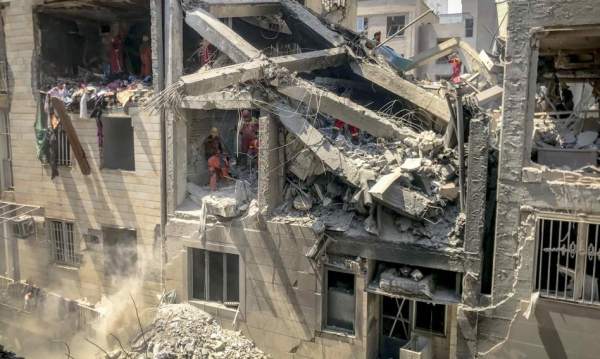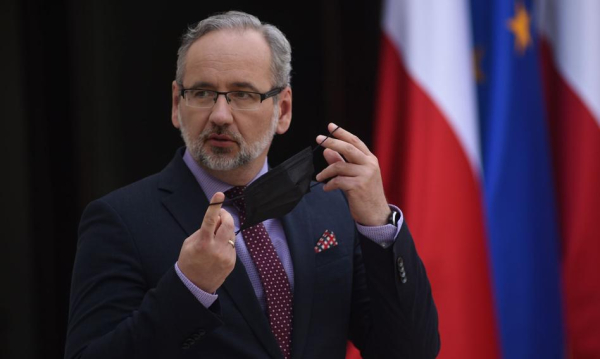Germany, France and Britain are ready to immediately start talks with Iran over its nuclear programme to help stem rising tensions in the Middle East, German Foreign Minister Johann Wadephul said on Sunday.

Wadephul, who is currently in Saudi Arabia, said he was making efforts to de-escalate the conflict between Israel and Iran. He also said Tehran had missed an opportunity to start constructive talks, Reuters reported.
Since April, the United States and Iran have held five rounds of negotiations on a deal that would limit Iran's nuclear program in exchange for the lifting of some sanctions on the Iranian side. Oman's foreign ministry announced on Saturday that it had canceled another round of talks scheduled for Sunday. Tehran said that after the Israeli attacks began, those negotiations were pointless. Washington has signaled that it wants to continue the talks.
“I hope it is still possible. Germany, together with France and Great Britain, is ready. We offer Iran immediate negotiations on its nuclear program. I hope (the offer) will be accepted,” Wadephul said on Sunday.
“A key prerequisite for de-escalating the conflict is that Iran must not pose any threat to the region, to the state of Israel or to Europe,” the German foreign minister stressed.
Iraq Calls on US to Stop Israel. Azerbaijan Will Not Allow Attacks on “Friendly Iran ” from Its Territory
The government in Baghdad called on the US authorities on Saturday to stop Israeli aircraft violating Iraqi airspace to attack Iran. The Baku Foreign Ministry assured the same day that it would never allow Israel to use Azerbaijani territory to attack Iran.
“The Iraqi government calls on the United States to fulfill its obligations under the bilateral agreement and prevent Zionist entity aircraft from violating Iraqi airspace again,” Baghdad said in a statement.
Azerbaijan “will never allow its territory to be used to attack third countries, including friendly Iran,” Azerbaijani Foreign Minister Jeyhun Bayramov said in a telephone conversation with his Iranian counterpart Abbas Aragchi.
Bayramov warned that the conflict between Israel and Iran threatened to spread throughout the region and called for diplomatic efforts to stop further escalation, the Baku Foreign Ministry said after the conversation.
Iraq closed its airspace Friday morning, shortly after Israel launched a massive airstrike against Iran. Israel says it attacked Iranian nuclear and military facilities in a preemptive strike to eliminate the threat from that country. Iraqi airspace provides the shortest route from Israel to Iran.
Mostly Shiite Azerbaijan has strong economic and security ties with Israel. The country, which borders Iran, is a major supplier of oil to Israel, which in turn sells Azerbaijan weapons.
In turn, relations between Baku and Tehran are complex and complicated by, among other things, historical events and the large Azeri minority in Iran, as well as the different directions of the foreign policies of both countries.
There have long been reports in the media about close intelligence cooperation between Azerbaijan and Israel, allegedly aimed at Tehran, as well as speculation that Azerbaijani military bases could be used by the Israeli army to attack Iran.
Erdogan in conversation with Iranian president: Israel is sabotaging nuclear talks
Israeli Prime Minister Benjamin Netanyahu is trying to sabotage the nuclear negotiations between Iran and the United States, Turkish President Recep Tayyip Erdogan said in a conversation with Iranian President Masoud Peshekovskyi on Saturday.
During the telephone conversation, Erdogan strongly condemned “Israel's unlawful attacks on Iran and expressed condolences to the Iranian people for the loss of life,” the Turkish leader's press office said.
Erdogan stressed that “the attacks are a clear violation of international law and are aimed at drawing the entire region into the conflict.” The Turkish president also noted that Israel is “trying to distract the world from the genocide in the Gaza Strip by attacking Iran.”
The president assured Pezeshkian that Türkiye was closely monitoring developments regarding a potential nuclear leak at the Natanz facility following the Israeli attack.
Since April, the United States and Iran have held five rounds of talks on a deal that would curb Iran's nuclear program in exchange for the lifting of some sanctions on Tehran. Oman's Foreign Minister Badr al-Busaidi said Thursday that the sixth round of talks would be held Sunday in his country's capital, Muscat. On Saturday, Oman's Foreign Ministry announced the cancellation of Sunday's talks. The Iranians reportedly refused to participate in them because of Israel's objections.
President Erdogan warns regional leaders against Israel's aggressive policy
Turkish President Recep Tayyip Erdogan held telephone talks on Saturday with Saudi leader Mohammed bin Salman and Jordan's King Abdullah. Erdogan warned them about Israel's aggressive policies, which he said were the biggest threat to peace in the region.
In a conversation with Saudi Crown Prince and de facto leader Mohammed bin Salman, Erdogan said that “by attacking Iran, the Israeli government has once again shown that it is the biggest threat to peace and stability in the region.” “Israel must be stopped in order to de-escalate tensions,” the Turkish president was quoted as saying by his press office.
Erdogan noted that “the indifference of the international community to the genocide in Palestine paved the way for Israel to go on impunity and aggression.” “Our region cannot bear another crisis. A potentially devastating war could trigger another wave of migration that will affect all Middle Eastern countries,” the president stressed in his conversation with the Saudi prince.
The Turkish leader also discussed the situation in the region with Jordan's King Abudall II, telling him that “the aggressive and unlawful policies of Benjamin Netanyahu's government pose a threat to the stability and peace of the entire globe,” Anadolu News Agency reported.
Erdogan also stressed that the dispute over Iran's nuclear program can only be resolved through negotiations.
Macron urges Iran to return to nuclear talks
French President Emmanuel Macron on Saturday called on Iranian authorities to “quickly return to the negotiating table” on de-escalation in the Middle East and on Iran's nuclear program.
“The issue of the Iranian nuclear program is serious and must be resolved through negotiations,” Macron wrote on X after a telephone conversation with his Iranian counterpart Masoud Peshehkian.
Macron also called for the release of two French citizens held hostage by the regime in Tehran for three years. He also demanded that French citizens and facilities in Iran and the region “not be targeted in any way.”
The French president called on Pesheshkian “to quickly return to the negotiating table in order to reach an agreement, which is the only possible way to de-escalate the situation,” pledging assistance in this process.
Following Israel's attack on Iran, Macron convened a meeting of the National Security Council on Friday, saying Israel has the right to ensure its own security.
That same day, the president said Iran “bears grave responsibility” for the destabilization in the region. He stressed that Paris had not participated in Israeli attacks on Iran and “does not share this approach and the need for a military operation.”
French Interior Minister Bruno Retailleau has ordered prefects to strengthen security measures in the country due to the escalation of the armed conflict between Israel and Iran.
French Foreign Minister: Iran's nuclear program a threat to the security of Europe and Israel
French Foreign Minister Jean-Noel Barrot said Sunday that Iran's nuclear program is a threat to the security of Europe and Israel, saying he believes that diplomacy is the only way to avoid an escalation of the Israeli-Iranian conflict.
In an interview with RTL radio, the Foreign Minister said that “at this stage” France had not mobilised its military assets to help Israel intercept Iranian missiles aimed at its territory.
German Foreign Minister: The danger of further escalation in the Middle East is real
German Foreign Minister Johann Wadephul believes that the danger of further escalation of the conflict in the Middle East “is real”, and that Iran's nuclear program poses a threat not only to Israel, but also to Saudi Arabia and the stability of the entire region.
“In the current situation, we cannot lose sight of the Gaza Strip,” the head of German diplomacy emphasized during his visit to Saudi Arabia, quoted on Platform X by the German Foreign Ministry. The humanitarian situation is catastrophic, the minister added.
“A ceasefire requires a common perspective on the period after it. The Arab Reconstruction Plan is an important basis,” Wadephul said.
The ARD news portal tagesschau quotes Wadephul as saying, after a meeting in the Saudi capital Riyadh with his counterpart Faisal bin Farhan, in the context of the armed conflict between Israel and Iran: “I am in favor of de-escalation and finding a way out of further military confrontation.”
“A further escalation of the situation would have incalculable consequences. That is why I would like to appeal to everyone: as is often said, it is not too late,” Wadephul said. “This region needs peace, not escalation of armed conflicts,” he added.
Starmer: We are sending planes to the Middle East to support regional security
Britain is sending combat aircraft to the Middle East to support security in the region, British Prime Minister Keir Starmer said on Saturday.
“We are moving resources into the region, including aircraft to provide emergency support,” Starmer said aboard a plane bound for Canada for the three-day G7 summit, which begins Sunday in Kananaskis, Alberta.
As Reuters recalled, British warplanes are already present in the Middle East as part of an operation aimed at countering threats in Iraq and Syria.
Starmer said he had spoken to US President Donald Trump and Israeli Prime Minister Benjamin Netanyahu after Israel launched attacks on Iran on Friday, and British Foreign Secretary David Lammy was in contact with his Iranian counterpart Abbas Aragchi.
“The reports of attacks are disturbing and we call on all parties to withdraw and reduce tensions urgently,” Starmer said on Friday, saying “stability in the Middle East must be the priority.”
British Chancellor: We Could Potentially Support Israel in Conflict with Iran
Britain could potentially support Israel in a conflict with Iran, but our additional warplanes have been sent to the Middle East primarily to protect British bases and personnel in the region, Chancellor Rachel Reeves told Sky News on Sunday.
Asked by a British broadcaster whether Britain would come to Israel's aid if asked, Reeves recalled that “in the past (the UK) has supported Israel when the rockets have come in.” “Israel has the right to defend itself,” she added.
However, our main goal at the moment is de-escalation, not further escalation of tensions, the minister assured.
The government in London appealed to its citizens on Sunday to “avoid all travel to Israel and the occupied Palestinian territories . ” Previous guidance had advised against all but essential travel to Israel.
Lavrov condemns Israel's use of force against Iran
Russian Foreign Minister Sergei Lavrov on Saturday condemned Israel's use of force against Iran, offering the Iranian side help in de-escalating the conflict in the Middle East.
In a telephone conversation with his Iranian counterpart Abbas Aragchi, the Russian foreign minister said Moscow could help de-escalate the situation in the region following Israel's attack on Iran on Friday and the Iranian response.
According to a statement quoted by Reuters, Russia is ready to continue work on resolving issues related to Iran's nuclear program.
Lavrov expressed his condolences to Aragchi on Saturday over the deaths of Iranians killed in the attacks.
Russian leader Vladimir Putin also expressed his condolences to the Iranian side on Friday, speaking by phone with Iranian President Masoud Pesheshkian. Putin condemned Israel's actions, calling for “the resolution of all issues related to Iran's nuclear program exclusively through political and diplomatic means.”
Oman's MFA: There will be no next round of US-Iran nuclear talks
Oman's Foreign Ministry announced Saturday that it had canceled the next round of talks between the U.S. and Iran on the nuclear deal scheduled for Sunday. Tehran said that negotiations were pointless after the Israeli attacks. Washington has signaled that it wants to continue the talks.
The talks scheduled for Sunday in Muscat will not take place, but “diplomacy and dialogue remain the only path to lasting peace,” Omani Foreign Minister Badr al-Busaidi told X.
Since mid-April, the United States has been negotiating a nuclear deal with Iran that would limit that country's nuclear program in exchange for the lifting of some sanctions.
President Donald Trump has stressed that the primary U.S. goal is to prevent Iran from developing a nuclear weapon. He has repeatedly threatened military and economic consequences if Tehran rejects the agreement, but has emphasized that he prefers a diplomatic solution.
Five rounds of negotiations have been held so far, brokered by Oman. Media reports have shown that the parties' positions appear difficult to reconcile. Iran has rejected the US demand to stop enriching uranium.
“It is obvious that in such circumstances, as long as the aggression of the Zionist regime against the Iranian nation continues, there is no point in engaging in dialogue with the side that is the biggest supporter and accomplice of the aggressor,” Iranian Foreign Ministry spokesman Esmail Bagei said on Saturday.
U.S. Middle East envoy Steve Witkoff said Friday he wants to continue talks with Iran. After Sunday's talks were canceled, a senior U.S. official told Reuters he hoped the Iranians would “return to talks soon.”
According to unconfirmed reports, Trump agreed to an Israeli attack on Iran, and the operation was coordinated with the U.S. As recently as late May, Trump publicly declared that he had told Israeli Prime Minister Benjamin Netanyahu that an attack on Iran would be inappropriate because the U.S. was close to reaching an agreement with that country.
Trump on Friday praised the Israeli strikes and urged Iran to accept the agreement “before there’s nothing left of this country.”
“Maybe now they will negotiate seriously,” he told Axios. In statements to other media, Trump encouraged Iran to negotiate, saying Tehran now has a “second chance.” (PAP)






